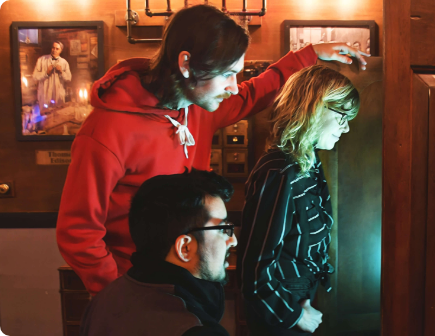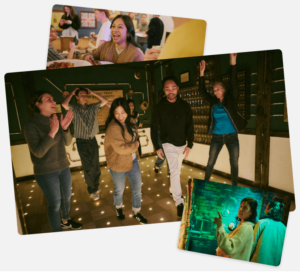A Planner’s Guide To Group Events: A Strategic Framework
Introduction: Planning Events That Aren’t Just Dinner
As an event planner, you face a recurring challenge: how to create an occasion that genuinely resonates with your group. The standard dinner reservation or happy hour can feel routine, often failing to produce the connection or excitement you aim for. The pressure is on to find unique group activities that leave a lasting impression, whether you’re organizing a corporate team-building off-site, a milestone birthday, or a special client outing. The goal is to craft an experience that becomes a shared memory, not just another entry in the calendar.
This guide is designed to be your strategic partner in that process. Instead of a generic list of ideas, we offer a decision-making framework to help you choose the perfect activity. We will walk you through a step-by-step process that starts with your core objectives and ends with flawless execution. This blueprint will empower you to move beyond the expected and select an event that aligns perfectly with your goals, group dynamics, and desired outcomes. Explore our Palace Games blog for more insights into creating memorable San Francisco experiences.
Step 1: Define Your Event’s Core Objective
The most successful events begin with a clear purpose. Before you can choose the right activity, you must understand the ‘why’ behind your gathering. The core objective will act as your compass, guiding every subsequent decision. Consider what you want your attendees to feel, think, or do as a result of the event. According to research on team dynamics, activities that align with specific goals are far more effective at producing desired outcomes, such as improved morale or collaboration [1].
Common objectives for group events include:
- Fostering Teamwork and Collaboration: The goal is to strengthen bonds and improve how a group works together. This is ideal for new teams, departments merging, or groups needing to break down silos and enhance communication.
- Celebrating a Milestone or Individual: The focus is on honoring a person, a team, or a company achievement. The activity should make the honoree(s) feel special and create a festive, memorable atmosphere for everyone.
- Pure Entertainment and Fun: Sometimes, the only goal is to have a great time. These events are about rewarding a team for their hard work, providing a much-needed break from the daily grind, and creating positive shared experiences.
- Sparking Friendly Competition: For certain groups, especially sales teams or naturally competitive individuals, a challenge with a clear winner can be highly motivating. The objective is to generate high energy, strategic thinking, and a spirited sense of rivalry.
Step 2: Assess Your Group’s Dynamics and Constraints
Once you have your objective, the next step is to tailor the activity to the people who will be attending. A one-size-fits-all approach rarely works. A thoughtful assessment of your group’s specific characteristics and the event’s logistical constraints is crucial for success.
Key factors to consider include:
- Group Size: An activity that is perfect for a small team of eight will not work for a department of 80. The logistics, venue, and nature of the interaction change dramatically with scale. Some venues offer flexible solutions; for instance, Palace Games can accommodate a single team in one room or host large group events by booking multiple rooms for simultaneous play.
- Physicality Level: Consider the physical abilities and comfort levels of your attendees. A strenuous outdoor hike might be perfect for one group but exclusionary for another. Be realistic about what your group will enjoy, and always offer alternatives if the activity is physically demanding.
- Group Relationship: Are you planning for a team of new hires who barely know each other or for longtime colleagues with established relationships? The existing group dynamic should influence your choice. An activity for a new group should facilitate introductions and build rapport, while an event for a seasoned team can handle more complex challenges.
- Budget: Your budget will naturally narrow your options. Be sure to account for all potential costs, including tickets, venue rental, food and beverage, and transportation. Premium experiences often have a higher upfront cost but can deliver a greater return in terms of impact and memorability.
A Framework of Event Categories
With your objective defined and your group’s dynamics assessed, you can now explore specific types of activities. To simplify the decision-making process, we have organized potential events into three distinct categories. Each category serves different goals and is suited to different groups. By choosing a category first, you can narrow your search and focus on options that are already aligned with your strategic goals.
- Competitive Challenges
- Creative Workshops
- Immersive Adventures
Category: Competitive Challenges
Definition: These are activities centered around team-versus-team or individual competition, culminating in a clear winner. The structure is designed to fuel energy and drive participants toward a specific goal.
- Pros: These events are typically high-energy and can be exceptionally effective for sales teams or other groups motivated by achievement and winning. They encourage strategic thinking under pressure and can create an exciting, memorable atmosphere.
- Cons: The focus on winning can sometimes overshadow the collaborative aspect. Research suggests that intense internal competition can sometimes lead to increased conflict and undermine psychological safety if not managed correctly [2]. It may also feel exclusionary for individuals who are not naturally competitive.
Category: Creative Workshops
Definition: These are hands-on, guided activities where the group learns a new skill and creates something tangible together. The focus is on the process of creation and relaxed social interaction.
- Pros: Workshops provide a relaxed and informal atmosphere that is conducive to conversation and bonding. Participants leave with a physical souvenir of the event, and the activities often appeal to a wide range of personalities and skill levels. Engaging in creative tasks is also shown to reduce stress and improve mental well-being [3].
- Cons: These events may lack the high-stakes excitement that some groups crave. The success of the workshop is often highly dependent on the quality and personality of the instructor.
- San Francisco Examples: A group cooking class at the Ferry Building, a pottery workshop at Clay by the Bay, or a painting and wine night at a local studio.
Category: Immersive Adventures
Definition: These are story-driven experiences that transport a group into a different world. Success requires the entire team to work together to solve a complex, narrative-based problem within a set time limit.
- Pros: Immersive experiences create powerful, lasting memories by engaging participants on an emotional and intellectual level. Studies on shared experiences show that synchronized emotions and collaborative imagination strengthen social connections [4]. These adventures foster deep collaboration, communication, and problem-solving in a completely novel environment, ensuring full engagement from the entire group.
- Cons: This category often represents a higher investment in terms of both price and time commitment. The success of the experience also relies on the full and active participation of everyone in the group.
- The Premier Example – Palace Games: This category is perfected by Palace Games, which offers award-winning escape adventures set within San Francisco’s historic Palace of Fine Arts. The experience is far more than a simple game; it is a 100-minute journey that integrates a rich narrative with unparalleled technology and puzzle design. Rooms like The Roosevelt Escape Room and The Edison Escape Room are meticulously crafted for small groups of 4-8 players. A booking costs a flat $425, making it a premium, all-inclusive choice for a team seeking a truly unique and cohesive adventure.
Step 3: Finalize Logistics and Enhance the Experience
After you have selected the perfect activity category and a specific vendor, the final step is to manage the logistical details to ensure a smooth and successful event. Careful planning at this stage prevents last-minute stress and allows you to focus on your guests during the event itself.
Key logistics to manage include:
- Booking and Payment: Premium and popular activities, especially in San Francisco, often book up weeks or even months in advance. Secure your date as early as possible. Be sure to clarify the booking and cancellation policies upfront to avoid any surprises.
- Communication: Send clear and concise information to your attendees. This should include the date, time, location with directions, parking information, and any special instructions regarding attire or what to bring. A well-informed guest is a happy guest.
- Enhance the Experience: Consider what happens before and after the main event. Booking a space for a post-activity debrief, meal, or celebration can extend the positive experience. For groups playing at Palace Games, the rentable ‘Game Room‘ provides a private, convenient space for up to 16 guests to gather for a meeting or social hour immediately following their adventure.
Conclusion: Your Blueprint for an Unforgettable Event
Planning a group event that rises above the ordinary does not have to be daunting. By using this simple but powerful framework—Define Goals -> Assess Group -> Choose a Category -> Plan Logistics—you can confidently select an activity that delivers meaningful results. Moving beyond the default of dinner and drinks is about creating shared experiences that build relationships, foster collaboration, and become the stories your team tells for years to come.
While each category has its merits, immersive adventures stand out as the pinnacle of experiential events, weaving together story, challenge, and teamwork into one cohesive whole. For those in San Francisco, Palace Games offers one of the most unique and highly-rated team experiences in the world, providing a blueprint for an event that is truly unforgettable.



